#datascience using python
Explore tagged Tumblr posts
Text
Techaircraft
Dive into the future of technology with Artificial Intelligence powered by Python, now enhanced by our collaboration with Techaircraft! We’re combining AI’s transformative potential with Python’s versatility to develop groundbreaking solutions that drive innovation and efficiency. From advanced machine learning algorithms to smart automation, our partnership is set to revolutionize industries and push tech boundaries. Discover how Techaircraft’s expertise and Python’s capabilities are shaping the future of AI. Ready to explore the possibilities? Join us on this tech journey and witness the next evolution in intelligent solutions! . 𝐖𝐞𝐛𝐬𝐢𝐭𝐞 - www.techaircraft.com
𝐓𝐞𝐜𝐡𝐚𝐢𝐫𝐜𝐫𝐚𝐟𝐭 𝐬𝐮𝐩𝐩𝐨𝐫𝐭 𝐝𝐞𝐭𝐚𝐢𝐥𝐬:
𝐌𝐨𝐛𝐢𝐥𝐞 𝐍𝐮𝐦𝐛𝐞𝐫 - 8686069898
#ArtificialIntelligence#Python#MachineLearning#AI#TechInnovation#DataScience#DeepLearning#SmartTech#Coding#AIRevolution#PythonProgramming#TechTrends#FutureOfAI#Automation#TechEvolution

2 notes
·
View notes
Text
Embarking on the Odyssey of Data Science Mastery: A Comprehensive 8-Step Guide
Navigating the dynamic waters of data science requires a combination of technical acumen and analytical finesse. This comprehensive guide unfolds an 8-step roadmap, not just to become a data scientist but to master the intricate art and science that defines this dynamic field.

1. Building a Sturdy Mathematical Foundation: The Pillars of Understanding
Embark on your journey with a laser focus on constructing a formidable foundation in fundamental mathematical principles, probability theory, and statistics. This foundational knowledge serves as the bedrock upon which you'll interpret data and seamlessly implement statistical models with precision.
2. Mastering Programming Languages: The Data Scientist's Linguistic Proficiency
In the vast toolkit of a data scientist, mastery in a programming language is key. Delve into the intricacies of Python or R, navigating the landscape of data manipulation libraries like Pandas or data.table. These tools become your allies in handling large datasets with finesse.
3. Navigating Data Analysis Libraries: Unleashing the Power of Manipulation
With programming proficiency comes the need to manipulate and analyze data efficiently. This is where libraries like Pandas (Python) and dplyr (R) shine. Pandas, known for its ease of use, provides data structures and functions needed to manipulate structured data seamlessly, while dplyr simplifies data manipulation in R.
4. Crafting Visual Narratives: The Art of Data Visualization
Transforming complex insights into compelling visual narratives is the hallmark of a skilled data scientist. Immerse yourself in the world of data visualization tools such as Matplotlib, Seaborn, or ggplot2. Through mastery of these tools, your analytical findings metamorphose into visually striking stories.
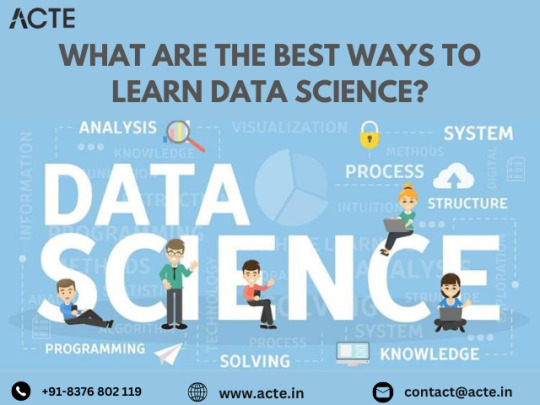
5. Navigating the Landscape of Machine Learning Basics: Algorithms as Your Guide
Machine learning (ML) is the heart of data science. Start with the basics – linear regression, logistic regression, and classification algorithms. Platforms like Scikit-Learn (Python) and caret (R) provide practical implementations. A solid grasp of the fundamentals empowers you to tackle a myriad of real-world problems.
6. Bridging Theory and Practice: The Power of Hands-On Projects
Theoretical knowledge gains potency when applied. Platforms like Kaggle provide datasets and competitions, allowing you to test your skills in a real-world context. Building a portfolio of projects showcases your skills to potential employers and collaborators.
7. Structured Learning Paths: The Guiding Compass of Online Courses
The world of data science is vast, and structured courses can act as your compass. Platforms like Coursera, edX, and Udacity offer courses tailored to various aspects of data science. These courses provide not just theoretical knowledge but hands-on experience, ensuring a well-rounded education.
8. Learning Together: The Vibrant Tapestry of Community Engagement
Data science is not a solitary pursuit. Engage with the community. Platforms like Stack Overflow, Reddit (r/datascience), and GitHub offer spaces to ask questions, share insights, and learn from experienced practitioners. Actively participating in the data science community exposes you to the latest trends, tools, and best practices.
Conclusion: A Journey of Continuous Discovery Embarking on the data science odyssey is not a sprint; it's a marathon of continuous learning. Each step in this guide is a stepping stone, guiding you through the intricate landscape of data science. As you navigate through the sea of data, may your curiosity be your compass, and may the insights you unearth become beacons of knowledge in the vast realm of data science. Best of luck on your journey!
#data science course#datascience#technology#data science certification#data science training#tech#education
4 notes
·
View notes
Text
Hyperparameter tuning in machine learning
The performance of a machine learning model in the dynamic world of artificial intelligence is crucial, we have various algorithms for finding a solution to a business problem. Some algorithms like linear regression , logistic regression have parameters whose values are fixed so we have to use those models without any modifications for training a model but there are some algorithms out there where the values of parameters are not fixed.
Here's a complete guide to Hyperparameter tuning in machine learning in Python!
#datascience #dataanalytics #dataanalysis #statistics #machinelearning #python #deeplearning #supervisedlearning #unsupervisedlearning
#machine learning#data analysis#data science#artificial intelligence#data analytics#deep learning#python#statistics#unsupervised learning#feature selection
3 notes
·
View notes
Text

Buy eBay Seller Accounts Find us at Email:[email protected] WhatsApp: +18573556333 Telegram: @SmmServicesUSA Buy Link: https://smmservicesusa.com/product/buy-ebay-seller-accounts/ #buyverifiedebayaccounts #buyebayaccounts #ebayaccounts #Ebay #MachineLearning #DataScience #5G #100DaysOfCode #Python #Cybersecurity #BigData #AI #IoT #DeepLearning #ArtificialIntelligence #NLP #robots #Industry40 #tech #javascript30
1 note
·
View note
Text

📚 Struggling with ICT303 Advanced Machine Learning & AI? We've got you covered! 🤖💡
Need help cracking those complex algorithms, neural networks, or model evaluations for your ICT303 assignment? Our expert team is here to support you every step of the way — from understanding the theory to completing practical coding tasks. 🔍📈
✅ Supervised & Unsupervised Learning ✅ Neural Networks & Deep Learning ✅ Model Optimization & Evaluation ✅ Python, Scikit-Learn, TensorFlow Support ✅ On-time, plagiarism-free work!
📥 DM us now or drop a comment below to get started with ICT303 assignment help!
#MachineLearning #AI #ICT303 #AssignmentHelp #ArtificialIntelligence #StudentSupport #MLassignment #DeepLearning #DataScience
0 notes
Text
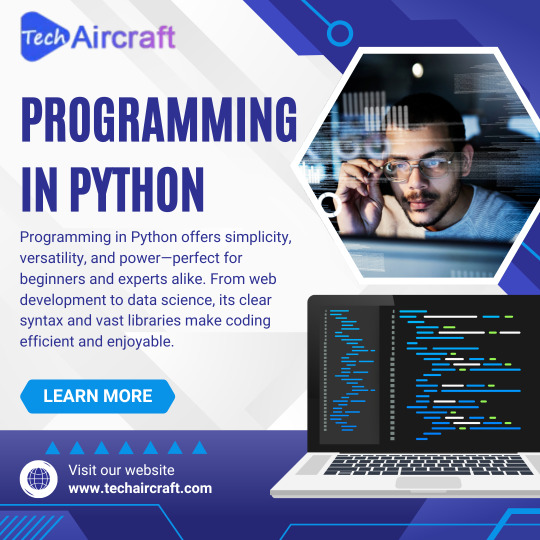
🐍 Programming in Python – Code Smart, Think Big! 💻 Ready to dive into the world of programming? Start with Python, one of the most beginner-friendly and powerful languages used by developers, data scientists, and tech giants worldwide. Whether you're aiming for web development, automation, data analysis, AI, or machine learning—Python is your gateway. Our Python programming course covers the fundamentals to advanced concepts with real-world projects, hands-on practice, and expert guidance. No prior coding experience? No problem! Learn at your own pace and build your first app, script, or data dashboard in no time. It’s time to turn your curiosity into capability. Start coding today. The future is written in Python. 🚀🧠
#LearnPython #PythonProgramming #CodeWithPython #ProgrammingBasics #TechSkills #FutureReady #PythonForBeginners #CodingJourney #AIWithPython #DataScience #Automation #MachineLearning #PythonCourse #DeveloperSkills #StartCodingToday
0 notes
Text
From Math to Machine Learning: A Comprehensive Blueprint for Aspiring Data Scientists
The realm of data science is vast and dynamic, offering a plethora of opportunities for those willing to dive into the world of numbers, algorithms, and insights. If you're new to data science and unsure where to start, fear not! This step-by-step guide will navigate you through the foundational concepts and essential skills to kickstart your journey in this exciting field. Choosing the Best Data Science Institute can further accelerate your journey into this thriving industry.
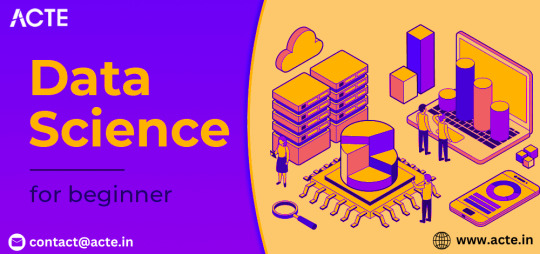
1. Establish a Strong Foundation in Mathematics and Statistics
Before delving into the specifics of data science, ensure you have a robust foundation in mathematics and statistics. Brush up on concepts like algebra, calculus, probability, and statistical inference. Online platforms such as Khan Academy and Coursera offer excellent resources for reinforcing these fundamental skills.
2. Learn Programming Languages
Data science is synonymous with coding. Choose a programming language – Python and R are popular choices – and become proficient in it. Platforms like Codecademy, DataCamp, and W3Schools provide interactive courses to help you get started on your coding journey.
3. Grasp the Basics of Data Manipulation and Analysis
Understanding how to work with data is at the core of data science. Familiarize yourself with libraries like Pandas in Python or data frames in R. Learn about data structures, and explore techniques for cleaning and preprocessing data. Utilize real-world datasets from platforms like Kaggle for hands-on practice.
4. Dive into Data Visualization
Data visualization is a powerful tool for conveying insights. Learn how to create compelling visualizations using tools like Matplotlib and Seaborn in Python, or ggplot2 in R. Effectively communicating data findings is a crucial aspect of a data scientist's role.
5. Explore Machine Learning Fundamentals
Begin your journey into machine learning by understanding the basics. Grasp concepts like supervised and unsupervised learning, classification, regression, and key algorithms such as linear regression and decision trees. Platforms like scikit-learn in Python offer practical, hands-on experience.
6. Delve into Big Data Technologies
As data scales, so does the need for technologies that can handle large datasets. Familiarize yourself with big data technologies, particularly Apache Hadoop and Apache Spark. Platforms like Cloudera and Databricks provide tutorials suitable for beginners.
7. Enroll in Online Courses and Specializations
Structured learning paths are invaluable for beginners. Enroll in online courses and specializations tailored for data science novices. Platforms like Coursera ("Data Science and Machine Learning Bootcamp with R/Python") and edX ("Introduction to Data Science") offer comprehensive learning opportunities.
8. Build Practical Projects
Apply your newfound knowledge by working on practical projects. Analyze datasets, implement machine learning models, and solve real-world problems. Platforms like Kaggle provide a collaborative space for participating in data science competitions and showcasing your skills to the community.
9. Join Data Science Communities
Engaging with the data science community is a key aspect of your learning journey. Participate in discussions on platforms like Stack Overflow, explore communities on Reddit (r/datascience), and connect with professionals on LinkedIn. Networking can provide valuable insights and support.
10. Continuous Learning and Specialization
Data science is a field that evolves rapidly. Embrace continuous learning and explore specialized areas based on your interests. Dive into natural language processing, computer vision, or reinforcement learning as you progress and discover your passion within the broader data science landscape.
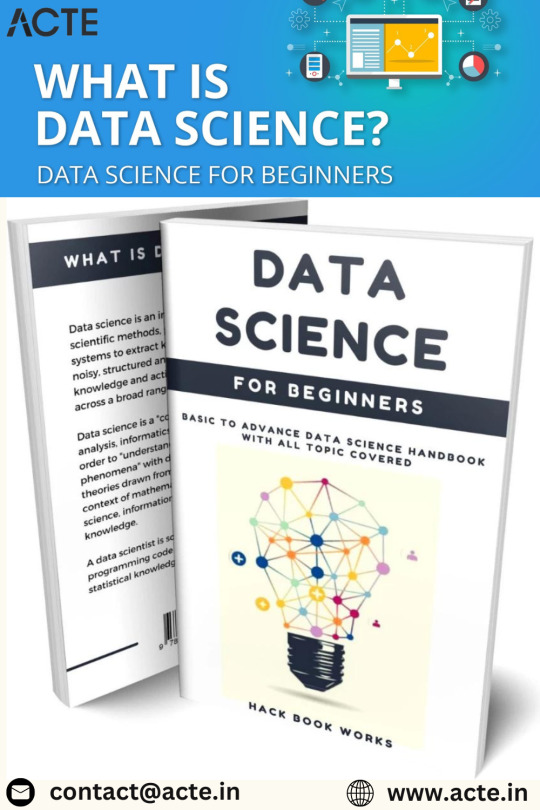
Remember, your journey in data science is a continuous process of learning, application, and growth. Seek guidance from online forums, contribute to discussions, and build a portfolio that showcases your projects. Choosing the best Data Science Courses in Chennai is a crucial step in acquiring the necessary expertise for a successful career in the evolving landscape of data science. With dedication and a systematic approach, you'll find yourself progressing steadily in the fascinating world of data science. Good luck on your journey!
3 notes
·
View notes
Text
Why You Should Study Datascience in Latvia
Unilife Abroad Career Solutions

In a world driven by data, Data Science has emerged as one of the most sought-after and rewarding careers. If you're aspiring to become a data expert, choosing the right destination for your studies is crucial. One of the most underrated yet powerful options? Latvia – a rising star in European education.
Why Latvia?
Located in Northern Europe, Latvia is a member of the European Union and the Schengen Area, offering international students access to high-quality education and a gateway to the entire EU. Over the years, Latvia has gained attention for its affordable, English-taught programs, modern infrastructure, and growing tech ecosystem.
Why Study Data Science in Latvia?
1. Globally Recognized Education at Low Cost
Latvian universities offer bachelor’s and master’s degrees in Data Science at significantly lower tuition fees compared to countries like the USA, UK, or Canada – without compromising on quality.
2. Programs in English
Most universities offer Data Science programs fully in English, making it accessible for students from all over the world.
3. Strong Focus on Practical Skills
Courses include hands-on learning in:
Machine Learning
Big Data
Python, R, and SQL
AI & Predictive Analytics You’ll work on real-world projects and case studies, making you job-ready by graduation.
4. Post-Study Work Opportunities
After graduation, international students can apply for job-seeking or work visas, and with Latvia’s booming tech industry, there’s a growing demand for skilled data professionals.
5. Pathway to European PR
Since Latvia is in the EU, studying there opens the door to job opportunities and permanent residency in other Schengen countries.
6. Affordable Living & Safe Environment
Latvia offers a high quality of life at a low cost. Cities like Riga are known for being student-friendly, safe, and culturally rich.
Who Can Apply?
Students from science, math, computer science, or engineering backgrounds are ideal candidates. Some universities even offer foundation programs if you need help meeting academic or language requirements.
Ready to Start Your Data Science Journey?
Whether you're looking for affordable education, a career in Europe, or a future in tech, Latvia checks all the boxes.
Contact us today to know the best universities, eligibility, and admission process. We’re here to guide you from application to visa and beyond!
8428440444 – 8428444044
1 note
·
View note
Text
🚀 Thinking of switching to Data Science but worried about your coding skills?
You're not alone! 🔍 One of the biggest myths in analytics is that you must have a strong IT or programming background to succeed. The truth? You don’t need to be a coding expert to kick-start your data science journey.
✅ Basic programming knowledge (in Python or R) is enough to apply mathematical concepts using built-in functions — no deep dives into complex data structures required!
📖 Read our latest blog to bust the myth and understand what really matters in data science: 👉 https://analyticsjobs.in/does-data-science-require-coding/
#DataScience #CareerSwitch #NonTechToTech #AnalyticsJobs #Python #LearnDataScience #CareerGrowth
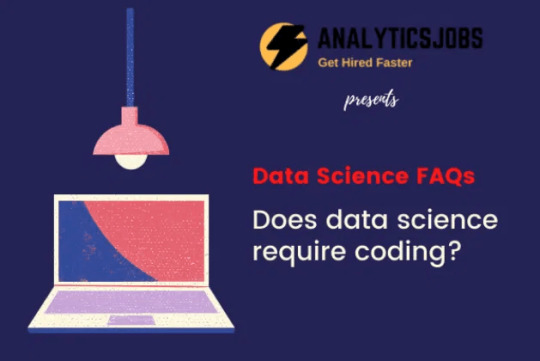
0 notes
Text
Level Up Data Science Skills with Python: A Full Guide
Data science is one of the most in-demand careers in the world today, and Python is its go-to language. Whether you're just starting out or looking to sharpen your skills, mastering Python can open doors to countless opportunities in data analytics, machine learning, artificial intelligence, and beyond.
In this guide, we’ll explore how Python can take your data science abilities to the next level—covering core concepts, essential libraries, and practical tips for real-world application.
Why Python for Data Science?
Python’s popularity in data science is no accident. It’s beginner-friendly, versatile, and has a massive ecosystem of libraries and tools tailored specifically for data work. Here's why it stands out:
Clear syntax simplifies learning and ensures easier maintenance.
Community support means constant updates and rich documentation.
Powerful libraries for everything from data manipulation to visualization and machine learning.
Core Python Concepts Every Data Scientist Should Know
Establish a solid base by thoroughly understanding the basics before advancing to more complex methods:
Variables and Data Types: Get familiar with strings, integers, floats, lists, and dictionaries.
Control Flow: Master if-else conditions, for/while loops, and list comprehensions through practice.
Functions and Modules: Understand how to create reusable code by defining functions.
File Handling: Leverage built-in functions to handle reading from and writing to files.
Error Handling: Use try-except blocks to write robust programs.
Mastering these foundations ensures you can write clean, efficient code—critical for working with complex datasets.
Must-Know Python Libraries for Data Science
Once you're confident with Python basics, it’s time to explore the libraries that make data science truly powerful:
NumPy: For numerical operations and array manipulation. It forms the essential foundation for a wide range of data science libraries.
Pandas: Used for data cleaning, transformation, and analysis. DataFrames are essential for handling structured data.
Matplotlib & Seaborn: These libraries help visualize data. While Matplotlib gives you control, Seaborn makes it easier with beautiful default styles.
Scikit-learn: Perfect for building machine learning models. Features algorithms for tasks like classification, regression, clustering, and additional methods.
TensorFlow & PyTorch: For deep learning and neural networks. Choose one based on your project needs and personal preference.
Real-World Projects to Practice
Applying what you’ve learned through real-world projects is key to skill development. Here are a few ideas:
Data Cleaning Challenge: Work with messy datasets and clean them using Pandas.
Exploratory Data Analysis (EDA): Analyze a dataset, find patterns, and visualize results.
Build a Machine Learning Model: Use Scikit-learn to create a prediction model for housing prices, customer churn, or loan approval.
Sentiment Analysis: Use natural language processing (NLP) to analyze product reviews or tweets.
Completing these projects can enhance your portfolio and attract the attention of future employers.
Tips to Accelerate Your Learning
Join online courses and bootcamps: Join Online Platforms
Follow open-source projects on GitHub: Contribute to or learn from real codebases.
Engage with the community: Join forums like Stack Overflow or Reddit’s r/datascience.
Read documentation and blogs: Keep yourself informed about new features and optimal practices.
Set goals and stay consistent: Data science is a long-term journey, not a quick race.
Python is the cornerstone of modern data science. Whether you're manipulating data, building models, or visualizing insights, Python equips you with the tools to succeed. By mastering its fundamentals and exploring its powerful libraries, you can confidently tackle real-world data challenges and elevate your career in the process. If you're looking to sharpen your skills, enrolling in a Python course in Gurgaon can be a great way to get expert guidance and hands-on experience.
DataMites Institute stands out as a top international institute providing in-depth education in data science, AI, and machine learning. We provide expert-led courses designed for both beginners and professionals aiming to boost their careers.
Python vs R - What is the Difference, Pros and Cons
youtube
#python course#python training#python institute#learnpython#python#pythoncourseingurgaon#pythoncourseinindia#Youtube
0 notes
Text
📈 From Non-Tech to Data Scientist: It’s Possible! 💪
🚀 Breaking the Myth: Does Data Science Require Coding?
Many aspiring data scientists often ask — “Do I need to be a coding expert to thrive in this field?” The short answer: No. 🙌
While coding is a fundamental part of data science, you don’t need to be a programming wizard to succeed. In fact, some of the most successful data scientists began their journeys without any IT or coding background!
At its core, coding in data science is just a tool — a way to communicate with your computer and bring your analytical ideas to life. Mastering complex algorithms isn’t a daily requirement. What really matters is understanding the syntax (in languages like Python or R) and applying mathematical concepts using built-in functions.
✨ Whether you're from a non-tech background or just getting started, there's space for you in this exciting field!
🔗 Dive into the full blog to explore more: https://analyticsjobs.in/does-data-science-require-coding/
#DataScience #CareerInDataScience #AnalyticsJobs #CodingInDataScience #Python #NonTechToTech #Upskill #AnalyticsCareers

0 notes
Text
How to Become a Data Scientist as a CSE Student?
If you’re a CSE (Computer Science and Engineering) student, chances are you’ve already heard the term data science quite a few times. It’s one of the fastest-growing career fields in tech—and for good reason. Companies across the world rely on data to make decisions, and they need skilled people who can make sense of all that information.
So, how do you become a data scientist when you’re still a student? Let’s break it down step by step.
Understand What a Data Scientist Really Does
A data scientist is someone who collects, cleans, and analyzes large amounts of data to help businesses or organizations make smarter decisions. This can involve writing code, using math, working with databases, and communicating findings clearly.
It’s not just about writing programs—it’s also about thinking critically and solving real-world problems with the help of data.
Step 1: Get Your Basics Right
As a CSE student, you already have a head start. Your curriculum likely includes core subjects like programming, algorithms, databases, and computer networks. Pay close attention to:
Python or R (Python is more widely used in data science)
SQL for handling data in databases
Math and Statistics, especially probability, linear algebra, and basic statistics
Data Structures and Algorithms for handling data efficiently
These skills form the foundation of data science work.
Step 2: Learn Data Science Tools and Libraries
Once you’re comfortable with basic programming and math, it’s time to explore tools used by data scientists. You don’t need to master everything at once—start small.
NumPy and Pandas (for handling and analyzing data)
Matplotlib and Seaborn (for creating charts and graphs)
Scikit-learn (for machine learning models)
Jupyter Notebooks (for writing and sharing your code easily)
Plenty of free tutorials and YouTube videos can help you practice these.
Step 3: Take Online Courses and Certifications
While your college of engineering and technology in Bhubaneswar may offer some electives or workshops, adding extra courses can boost your learning. Platforms like Coursera, edX, Udemy, and Kaggle offer beginner-friendly courses in data science and machine learning.
Look for beginner tracks with practical projects. Try courses like:
"Introduction to Data Science in Python"
"Machine Learning" by Andrew Ng
"Python for Data Science and AI" by IBM
These certifications can also strengthen your resume later on.
Step 4: Work on Real Projects
Theory is important, but nothing beats hands-on experience. Try simple projects first:
Analyze sales or weather data
Build a movie recommendation system
Predict house prices using public datasets
Visualize COVID-19 data trends
You can find datasets on sites like Kaggle, UCI Machine Learning Repository, or Google Dataset Search. Try to write a short blog post or upload your project to GitHub so others can see your work.
Step 5: Join Internships and Communities
Real-world experience can help you build both skills and confidence. Look for internships related to data analysis, data science, or even software roles that deal with data.
Also, join online communities like:
Kaggle (for competitions and discussions)
Reddit’s r/datascience
LinkedIn groups focused on analytics
Discord or Telegram groups for peer learning
You’ll learn a lot from seeing what others are doing and sharing your progress too.
Step 6: Build a Portfolio
Before applying for full-time jobs, put together a portfolio. This can include:
2–3 well-documented projects
A GitHub profile with clean code
A short resume highlighting your tools and skills
A LinkedIn profile that reflects your interests in data science
If you're studying at a college of engineering and technology in Bhubaneswar, consider joining tech fests, project expos, or coding clubs that give you space to present your work.
Conclusions
Becoming a data scientist as a CSE student doesn’t require fancy degrees or expensive tools. What you do need is consistency, curiosity, and a clear plan. Start with your basics, explore tools, build small projects, and grow step by step.
The field of data science is full of opportunities—and your classroom is just the beginning.
#top 5 engineering colleges in bhubaneswar#top engineering colleges in odisha#bhubaneswar b tech colleges#college of engineering and technology bhubaneswar#best colleges in bhubaneswar#college of engineering bhubaneswar
0 notes
Text

📊🤖 Struggling with MAT3120 Machine Learning and Data Visualisation? We’ve got your back! 💡📚
Whether it’s data preprocessing, model building, or visualisation techniques, our expert tutors are ready to help you ace your assignments with confidence! 🎯
✅ Tailored support for your specific questions
✅ Assistance with Python, R, and ML libraries
✅ Help with data visualisation tools and techniques
✅ On-time delivery & 100% original content
📥 Drop us a message now or comment below for quick help!
#MAT3120 #MachineLearningHelp #DataVisualisation #AssignmentHelp #StudentSupport #MLProjects #DataScience #ECU #MachineLearning #ECUStudents #StudySmart #FutureReady #DataScience #ArtificialIntelligence
0 notes
Text
🚀 Join Us for a Free Demo Class on April 14th! 🎓 Ascent Software Training Institute – Empowering IT Careers with Industry-Focused Courses!
🌐 Classroom & Online Training Available 💼 Hands-on Projects | 📊 Placement Assistance | 💡 Expert Trainers
🕒 Course Timings:
AWS – 9:15 AM
Azure DevOps – 9:15 AM
DevOps – 11:00 AM
Data Science – 7:30 AM
Full Stack Python – 10:00 AM
Power BI – 8:00 AM
React – 12:30 PM
Full Stack Java – 7:15 AM
📞 Contact Us: +91-9035037886 | 080-42191321 🔗 Website: https://asti.co.in
🌟 Limited slots available – Book your seat now and take your first step into tech!
#FreeDemoClass #AscentTraining #DevOps #Python #AWS #AzureDevOps #DataScience #PowerBI #ReactJS #JavaDeveloper #ITTraining #BTMBangalore #CareerLaunch #UpskillWithAscent
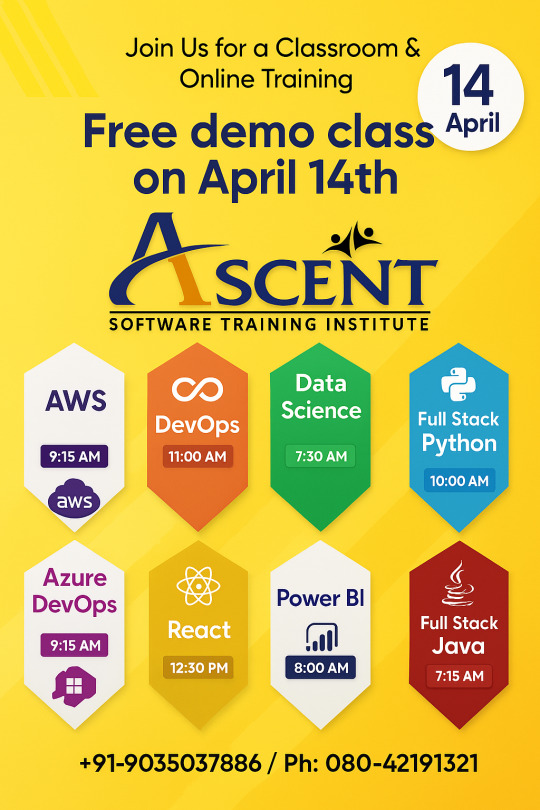
0 notes
Text
🚀 Master Advanced Data Analysis with Python! 🚀
Enhance your data analysis & machine learning skills with this comprehensive 5-day course!
✅ Master advanced statistical analysis & hypothesis testing ✅ Build predictive models with machine learning algorithms ✅ Clean, preprocess & visualize data using pandas, Seaborn & Plotly ✅ Gain a professional certificate & boost your career in data science!
🔗 Enroll Now
#DataScience #Python #MachineLearning #DataVisualization #Analytics #BigData #CareerGrowth #Training
#python training#machine learning#dataanalytics#careergrowth#management#risk management#business strategy#companies
0 notes
Text
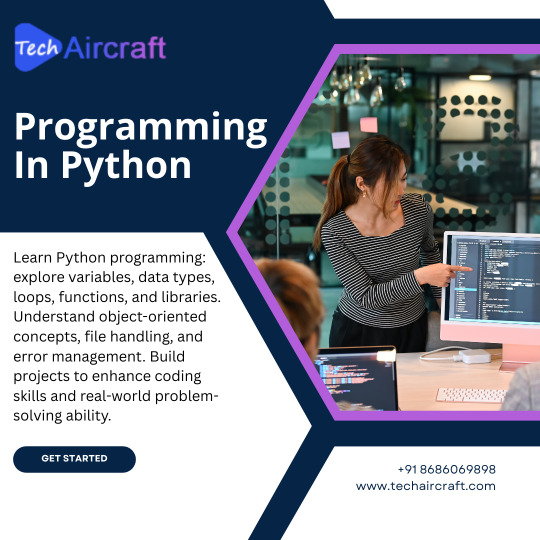
Start Your Coding Journey with Python – The Language of the Future! 🐍💻 Want to step into the world of programming? Python is the perfect place to begin! Known for its simplicity, readability, and versatility, Python is widely used in web development, data science, AI, machine learning, automation, and more. 🚀 Whether you're a complete beginner or looking to sharpen your skills, learning Python opens the door to endless opportunities. From building real-world projects to solving complex problems, Python helps you think logically and code smartly. 💡 Join the global community of Python developers and future-proof your career today. The best part? It’s fun, easy to learn, and in high demand!
🔥 Start learning now and turn your ideas into reality with Python!
#PythonProgramming #LearnToCode #CodingLife #PythonBeginners #ProgrammingInPython #TechSkills #CodeNewbie #DeveloperLife #AutomationWithPython #DataScience #MachineLearning #PythonProjects #CodingIsFun #FutureWithPython #TechJourney
0 notes